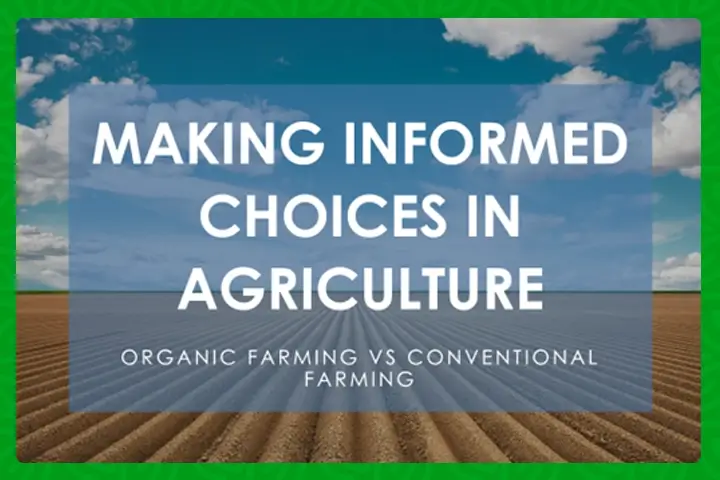
Written by Anil M V, 24 years experience, {Bsc. Agric, MBA, CTP}Founder, Organil Services
In today’s agricultural landscape, farmers face a critical decision: whether to adopt organic farming practices or stick with conventional methods. This choice isn’t merely about personal preference; it has far-reaching implications for environmental sustainability, public health, and the future of our food systems. Let’s delve into the key factors influencing this decision and explore the merits and challenges of both organic and conventional farming.
Understanding Organic Farming:
Organic farming is rooted in principles of sustainability, environmental stewardship, and natural resource conservation. It emphasizes soil health, biodiversity, and the use of organic inputs such as compost, cover crops, and natural pest control methods. Organic farmers eschew synthetic pesticides, fertilizers, and genetically modified organisms (GMOs), opting instead for holistic management practices that promote long-term soil fertility and ecosystem resilience.
Advantages of Organic Farming:
Organic farming minimizes chemical inputs, reducing the risk of water and soil contamination. By fostering biodiversity and enhancing soil health, organic systems contribute to ecosystem resilience and mitigate climate change impacts. Organic foods are produced without synthetic pesticides and fertilizers, reducing exposure to potentially harmful chemicals. Studies suggest that organic produce may contain higher levels of certain nutrients and antioxidants, offering potential health benefits. Consumer interest in organic products continues to grow, driving demand for organic produce and commodities. Organic certification provides farmers with access to premium markets and price premiums, offering economic incentives for adoption.

Challenges of Organic Farming:
Organic farming often yields lower initial crop yields compared to conventional methods, particularly during the transition period. Managing pests and diseases without synthetic inputs requires careful planning and investment in alternative strategies. Obtaining and maintaining organic certification can be a complex and costly process, involving rigorous standards and documentation requirements. Compliance with organic regulations adds administrative burden and may deter some farmers from transitioning to organic practices. While demand for organic products is growing, organic farmers may face challenges in accessing markets, particularly in regions with limited infrastructure or distribution networks. Building relationships with buyers and securing premium prices can require additional marketing efforts and investment.
Understanding Conventional Farming:
Conventional farming relies on synthetic inputs such as chemical fertilizers, pesticides, and herbicides to maximize crop yields and control pests and diseases. It often involves monoculture cropping systems, intensive tillage, and mechanization to streamline production and optimize efficiency.
Advantages of Conventional Farming:
Conventional farming techniques have been optimized over decades to maximize crop yields and productivity. Synthetic inputs and genetic engineering technologies enable farmers to produce large quantities of food on a consistent basis, supporting food security and affordability. Conventional farming practices often require less labor and management input compared to organic systems. Mechanization, precision agriculture technologies, and genetically modified crops allow farmers to achieve economies of scale and improve operational efficiency. Conventional farmers have access to a wide range of markets, including conventional, organic, and export channels. Flexibility in production methods and inputs enables farmers to adapt to market demand and capitalize on opportunities in diverse market segments.
Challenges of Conventional Farming:
Conventional farming relies heavily on synthetic inputs, which can contribute to soil degradation, water pollution, and biodiversity loss. Pesticide residues and nutrient runoff pose risks to human health and aquatic ecosystems, raising concerns about long-term sustainability. Over Reliance on chemical inputs can lead to the development of pesticide-resistant pests and weeds, requiring increasingly potent chemicals and escalating input costs. Monoculture cropping systems are vulnerable to pest outbreaks and disease epidemics, threatening crop resilience and stability. Growing awareness of environmental and health concerns associated with conventional farming has led to increased scrutiny and consumer demand for more sustainable alternatives. Negative perceptions of chemical residues and genetically modified organisms may influence consumer preferences and purchasing decisions.
Making the Choice: Factors to Consider
- Health Concerns: Organic food may reduce exposure to pesticides.
- Environmental Impact: Organic farming supports biodiversity and soil health.
- Personal Values: Choose based on your beliefs and priorities.
Making Informed Choices:
Ultimately, the choice between organic and conventional farming depends on a variety of factors, including environmental conditions, market dynamics, resource availability, and individual farm goals and values. Some farmers may opt for a hybrid approach, integrating elements of both organic and conventional systems to optimize sustainability, productivity, and profitability.
Investing in research, innovation, and education can help farmers make informed decisions and adopt best practices that balance economic viability with environmental stewardship and social responsibility. Collaborative efforts between farmers, researchers, policymakers, and consumers are essential for advancing sustainable agriculture and building resilient food systems for future generations.
The choice between organic and conventional farming is not a binary decision but rather a spectrum of approaches that require careful consideration of trade-offs and priorities. By embracing diversity, resilience, and continuous improvement, farmers can navigate the complexities of modern agriculture and contribute to a more sustainable and equitable food future.

Stay updated with the latest farming tips and agriculture industry news from Africa by subscribing to our newsletter. Don’t miss out on valuable insights and updates. Follow us on Twitter, LinkedIn, and Facebook to join our farming community and stay connected with us.



















